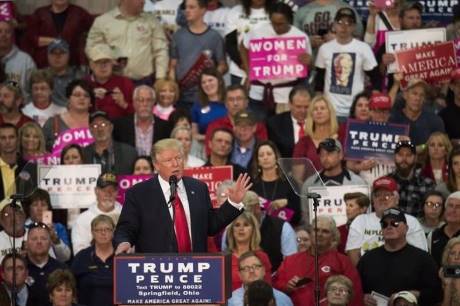As heads of state and business leaders react to US President-elect Donald Trump's victory, the implications of the new administration for nuclear programs in the USA and overseas are still to emerge.
 |
| Donald Trump campaigning in Springfield, Ohio last week (Image: @realDonaldTrump) |
The Trump campaign's position paper on energy promised to "(m)ake America energy independent, create millions of new jobs, and protect clean air and clean water". That vision included accessing the country's untapped shale, oil, and natural gas reserves as well as "hundreds of years in clean coal reserves", encouraging onshore and offshore leasing of federal lands and opening shale energy deposits for development. The position paper also promises to rescind certain executive actions by the Obama administration.
Trump's only campaign speech dedicated to energy policy was delivered at the Williston Basin Petroleum Conference in Bismarck, North Dakota in May. In it, Trump outlined an action plan that would see him rescind the USA's Climate Action Plan, "cancel" the Paris Agreement and "stop all payments of US tax dollars to UN global warming programs" within his first 100 days in office.
The US Environmental Protection Agency (EPA) issued its Clean Power Plan to curb greenhouse gas emissions from existing fossil fuel-fired power plants in August 2015, under which states are required to submit their plans to comply with reductions. The plan, which supports the use of wind and solar renewables as well as allowing credit for new nuclear power plants and uprates to existing units, does not credit the role of existing nuclear capacity. Earlier this year, the state of New York approved a policy explicitly recognising the contribution of existing nuclear plants as part of its efforts to comply with the EPA legislation.
The USA ratified the Paris Climate Change Agreement, which aims to keep global temperature increases this century well below 2 degrees Celsius, in September. The agreement entered into force earlier this month.
Trump's presidency will formally begin with his inauguration on 20 January 2017. Details have yet to emerge about who he will appoint to head departments including the Department of Energy (DOE) and the EPA. In September, however, the Scientific American reported that Myron Ebell, a "climate-change sceptic", would head Trump's transition plans for the EPA. The same report said energy lobbyist Mike McKenna would head the DOE team. Earlier in the year, Reuters named Harold Hamm, CEO of Oklahoma-based oil and gas exploration company Continental Resources, as the leading contender for the position of energy secretary in a future Trump administration.
The Trump administration's intentions regarding Iran's peaceful nuclear program are also uncertain. Citing Iran's IRNA news agency, Bloomberg reported President Hassan Rouhani of Iran as saying the US election result would not have any impact on the Joint Comprehensive Plan of Action (JCPOA) signed by Iran and the E3/EU+3 countries in 2015.
Maria Korsnick, the incoming president of the USA's Nuclear Energy Institute, issued a statement congratulating Trump and Vice President-elect Mike Pence on behalf of the US nuclear industry. "Throughout the presidential campaign nuclear energy was a bipartisan issue and one of the few areas of general agreement between the candidates. Additionally, public polling shows that the importance of nuclear energy to this nation's energy mix is one thing voters could agree on, irrespective of their candidate preference," Korsnick said.
"We encourage President-elect Trump to continue advancing his support for nuclear energy to maintain our nation's leadership in nuclear technology and its indispensable role in our critical energy infrastructure and environmental interests," she said.
Researched and written
by World Nuclear News







_94566.jpeg)






